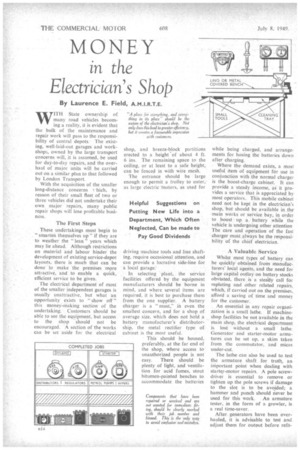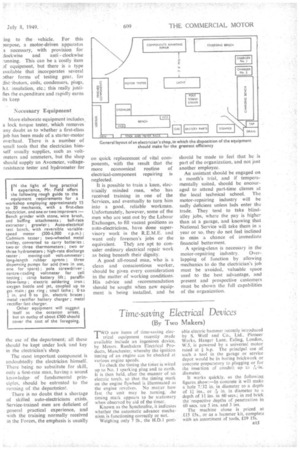MONEY
Page 20

Page 21

If you've noticed an error in this article please click here to report it so we can fix it.
in the Electrician's Shop By Laurence E. Field, A.M.I.R.T.E.
WITH State ownership of many road vehicles becoming a reality, it is evident that the bulk of the maintenance and repair work will pass to the responsibility of central depots. The existing, well-laid-out garages and workshops, owned by the large transport concerns will, it is assumed, be used for day-to-day repairs, and the overhaul of major units will be carried out on a similar plan to that followed by London Transport.
With the acquisition of the smaller long-distance concerns uhich, by reason of their small fleet of two or three vehicles did not undertake their own major repairs, many public repair shops will lose profitable business.
The First Steps
These undertakings must begin to "smarten themselves up" if they are to weather the " lean " years which may lie ahead. Although restrictions on material and labour hinder the development of existing service-depot layouts, there is much that can be done to make the premises more attractive, and to enable a quick, efficient service to be given.
The electrical department of most of the smaller independent garages is usually unattractive, but what an opportunity exists to "show off" this money-making section of the undertaking. Customers should be able to see the equipment, but access to the shop should not be encouraged. A section of the works can be set aside for the electrical shop, and breeze-block partitions erected to a height of about 4 ft. 6 ins. The remaining space to the ceiling, or at least to a safe height, can be fenced in with wire mesh.
The entrance should be large enough to permit a trolley to enter, as large electric -Motors, as used for
driving machine tools and line shafting, require occasional attention, and can provide a lucrative side-line for a local garage.
In selecting plant, the service facilities offered by the equipment manufacturers should be borne in mind, and where several items are required, it is best to purchase them from the one supplier. A battery charger is a " in even the smallest concern, and for a shop of average size, which does not hold a battery manufacturer's distributorship, the metal rectifier type of cabinet is the most useful.
This should be housed, preferably, at the far end of the shop, where access to unauthorized people is not easy. There should be plenty of light, and ventilation for acid fumes, stout bitumen-painted benches to accommodate the batteries while being charged, and arrangements for hosing the batteries down after charging.
Where the demand exists, a most useful item of equipment for use in conjunction with the normal charger is the boost-charge cabinet. It can provide a steady income, as it provides a service that is appreciated by most operators. This mobile cabinet need not be kept in the electrician's shop, but should be available in the' main works or service bay, in order to boost up a battery while the vehicle is undergoing other attention The care and operation of the fast charger must always be the responsibility of the chief electrician.
A Valuable Service
Whilst most types of battery can be quickly obtained from manufacturers' local agents, and the need for large capital outlay on battery stocks obviated, there is a steady call for replating and other related repairs, which, if carried out on the premises, afford a saving of time and money for the customer.
An essential in any repair organization is a small lathe. If machineshop facilities be not available in the main shop, the electrical department is lost without a small lathe. Generator and starter-motor armatures can be set up, a skim taken from the commutator, and micas under-cut.
The lathe can also be used to test the armature shaft for truth, an important point when dealing with startel-motor repairs. A pole screwdriver is essential to remove or tighten up the pole screws if damage to the slot is to be avoided; a hammer and punch should never be used for this work. An armature tester, in the form of a growler, is a real time-saver,
After generators have been overhauled, it is advisable to test and adjust them for output before refit
-log to the vehicle. For this aurpose, a motor-driven apparatus .s necessary, with provision for :lockwise and anti clockwise -unning. This can be a "costly item af equipment, but there is a type Ivailable that incorporates several ather forms of testing gear, for iist-ibutois, coils, condensers, plugs, h.t. insulation, etc.; this really justi
fies the expenditure and rabidly earns its keep Necessary Equipment More elaborate equipment includes _ a lock torque tester, which removes any doubt as to whether a first-class job has been made of a starter-motor overhaul. There is a number of small tools that the electrician himself usually supplies, such as voltmeters and ammeters, but the shop should supply an Avorneter, voltageresistance tester and hydrometer for the use of the department; all these should be kept under lock and key in the electrician's shop.
The most important component is undoubtedly the electrician himself. There being no substitute for skill, only a first-rate man, having a sound knowledge of fundamental principles, should be entrusted to the running of the departnfent.
There is no doubt that a shortage of skilled auto-electricians exists. Service-trained men are deficient of general practical experience, and with the training normally received in the Forces, the emphasis is usually on quick replacement of vital components, with the result that the more economical routine of electrical-component repairing is neglected.
It is possible to train a keen, electrically minded man, who has received training in one of the Services, and eventually to turn him into a good, reliable workman. Unfortunately, however, some of the men who are sent out by the Labour Exchanges, to fill vacant positions as auto-electricians, have done supervisory work in the R.E.M.E. and want only foremen's jobs or the equivalent. Th4 are apt to consider ordinary electrical repair work as being beneath their dignity.
A good all-round man, who is a clean and conscientious worker, should be given every consideration in the matter of working conditions. His advice and recommendation should be sought when new equipment is being installed, and he should be made to feel that he is part of the organization, and not just another employee.
An assistant should be engaged on a month's trial, and if temperamentally suited, should be encouraged to attend part-time classes at the local technical school. The motor-repairing industry will be sadly deficient unless lads enter the trade, They tend to take blindalley jobs, where the pay is higher than at a garage, and knowing that National Service will take them in a year or so, they do not feel inclined to miss a chance of immediate financial betterment.
A spring-clean is necessary in the
motor-repairing industry. Overlapping of function by allowing mechanics to do the electrician's job must be avoided, valuable space used to the best advantage, and present and prospective customers must be shown the full capabilities of the organization.


























